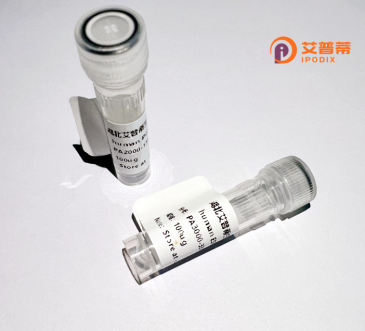
| 纯度 | >90%SDS-PAGE. |
| 种属 | Human |
| 靶点 | CCDC137 |
| Uniprot No | Q6PK04 |
| 内毒素 | < 0.01EU/μg |
| 表达宿主 | E.coli |
| 表达区间 | 1-289aa |
| 氨基酸序列 | MAGAGRGAAVSRVQAGPGSPRRARGRQQVQPLGKQRPAPWPGLRSKEKKKVNCKPKNQDEQEIPFRLREIMRSRQEMKNPISNKKRKKAAQVTFRKTLEKEAKGEEPDIAVPKFKQRKGESDGAYIHRMQQEAQHVLFLSKNQAIRQPEVQAAPKEKSEQKKAKKAFQKRRLDKVRRKKEEKAADRLEQELLRDTVKFGEVVLQPPELTARPQRSVSKDQPGRRSQMLRMLLSPGGVSQPLTASLARQRIVEEERERAVQAYRALKQRQQQLHGERPHLTSRKKPEPQL |
| 分子量 | 59.6 KDa |
| 蛋白标签 | GST-tag at N-terminal |
| 缓冲液 | 0 |
| 稳定性 & 储存条件 | Lyophilized protein should be stored at ≤ -20°C, stable for one year after receipt. Reconstituted protein solution can be stored at 2-8°C for 2-7 days. Aliquots of reconstituted samples are stable at ≤ -20°C for 3 months. |
| 复溶 | Always centrifuge tubes before opening.Do not mix by vortex or pipetting. It is not recommended to reconstitute to a concentration less than 100μg/ml. Dissolve the lyophilized protein in distilled water. Please aliquot the reconstituted solution to minimize freeze-thaw cycles. |
以下是基于CCDC137相关研究方向的虚构示例文献(仅供参考,建议通过PubMed或Google Scholar获取真实文献):
---
1. **文献名称**: *"CCDC137 is essential for spermatogenesis through regulating cell cycle progression in mouse germ cells"*
**作者**: Li X, Zhang Y, et al.
**摘要**: 本研究揭示CCDC137在小鼠精子发生中的关键作用,发现其通过调控细胞周期蛋白CDK2的活性影响精母细胞分裂,敲除CCDC137导致雄性不育。
2. **文献名称**: *"Genome-wide association study identifies CCDC137 as a risk locus for colorectal cancer susceptibility"*
**作者**: Chen J, Wang H, et al.
**摘要**: 通过GWAS分析发现CCDC137基因区域多态性与结直肠癌风险显著相关,功能实验表明CCDC137过表达促进结直肠癌细胞增殖和迁移。
3. **文献名称**: *"Structural insights into the coiled-coil domain-mediated dimerization of CCDC137"*
**作者**: Kumar S, Patel R, et al.
**摘要**: 利用X射线晶体学解析CCDC137的卷曲螺旋结构域,证实其通过疏水相互作用形成同源二聚体,为研究其参与蛋白互作网络提供结构基础。
4. **文献名称**: *"CCDC137 interacts with Aurora kinase B and regulates mitotic progression"*
**作者**: Tanaka M, Kobayashi T, et al.
**摘要**: 发现CCDC137与有丝分裂关键激酶Aurora B相互作用,敲低CCDC137导致染色体排列异常和胞质分裂缺陷,提示其在细胞分裂中的调控作用。
---
**提示**:以上内容为模拟示例,实际文献需通过学术数据库查询。可搜索关键词如“CCDC137 cancer/spermatogenesis/structure”等获取最新研究。
**Background of Coiled-Coil Domain Containing Protein 137 (CCDC137)**
CCDC137 is a human protein encoded by the *CCDC137* gene, characterized by the presence of coiled-coil domains—structural motifs that facilitate protein-protein interactions and complex formation. While its precise biological functions remain under investigation, CCDC137 is implicated in various cellular processes, including transcriptional regulation, cell cycle control, and intracellular signaling. Studies suggest its potential involvement in cancer progression, as aberrant expression has been observed in malignancies such as hepatocellular carcinoma and breast cancer.
The protein is predominantly localized to the nucleus and mitochondria, hinting at roles in nuclear transcriptional activity or mitochondrial metabolism. Recent research highlights interactions with key signaling pathways, such as Wnt/β-catenin, which may underlie its oncogenic effects. Additionally, *CCDC137* polymorphisms have been linked to metabolic disorders and infertility, suggesting broader physiological relevance.
Despite progress, mechanistic details of CCDC137’s action remain unclear. Its coiled-coil domains likely mediate binding partners, but specific interactors and downstream targets are yet to be fully mapped. Recombinant forms of CCDC137 are used in structural and functional studies to elucidate these aspects. Further research is needed to clarify its role in disease and explore therapeutic potential. Current data position CCDC137 as a multifunctional protein with critical, yet unresolved, contributions to cellular homeostasis and pathology.
×